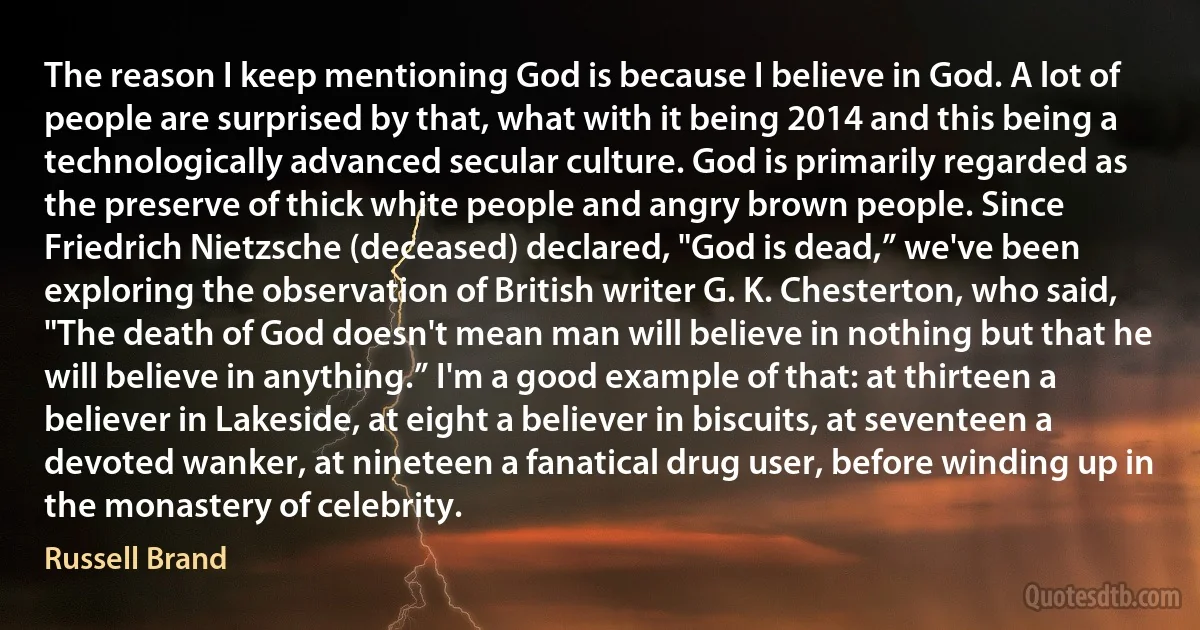Nietzsche Quotes - page 3
Nietzsche proposes the following brilliant hypothesis: The bad conscience is the deep-seated morbid condition that declared itself in man under the stress of the most radical change he has ever experienced when he found himself imprisoned in perpetuity within a society which was in- violable. All the strong and savage instincts such as adventurousness, rashness, cunning, rapacity, lust of power, which till then had not only been honoured, but actually encouraged, were suddenly put down as dangerous, and by degrees branded as immoral and criminal. Creatures adapted to a roving life of war and adventure suddenly saw all their instincts classed as worthless, nay, as forbidden. An immense despondency, a dejection without parallel, then took possession of them. And all these instincts that were not allowed an outward vent, turned inwards on the man himself feelings of enmity, cruelty, ... violence, persecution, destruction and thus the bad conscience originated.

Georg Brandes
Nietzsche asks how it has come about that so prodigious a contradiction can exist as that between the lack of true culture and the self-satisfied belief in actually possessing the only true one and he finds the answer in the circumstance that a class of men has come to the front which no former century has known, and to which (in 1873) he gave the name of "Culture-Philistines.”.

Georg Brandes
Islam is the first school of social thought that recognizes the masses as the basis, the fundamental and conscious factor in determining history and society not the elect as Nietzsche thought, not the aristocracy and nobility as Plato claimed, nor great personalities as Carlyle and Emerson believed, not those of pure blood as Alexis Carrel imagined, not the priests or the intellectuals, but the masses.

Ali Shariati
In my early twenties I read all Nietzsche-not just the main works but the minor works as well, all of them, and every scrap of published correspondence. Nietzsche alone of men out of books has a share in the loyalty and affectionate gratitude which otherwise belongs only to living teachers.

Enoch Powell
There continue to be complex debates about what Nietzsche understood truth to be. Quite certainly, he did not think, in pragmatist spirit, that beliefs are true if they serve our interests or welfare: we have just seen some of his repeated denials of this idea. The more recently fashionable view is that he was the first of the deniers, thinking that there is no such thing as truth, or that truth is what anyone thinks it is, or that it is a boring category that we can do without. This is also wrong, and more deeply so. Nietzsche did not think that the ideal of truthfulness went into retirement when its metaphysical origins were discovered, and he did not suppose, either, that truthfulness could be detached from a concern for the truth. Truthfulness as an ideal retains its power, and so far from his seeing truth as dispensable or malleable, his main question is how it can be made bearable.

Bernard Williams
Nietzsche ... did not settle for a demure civic conversation in the style of Richard Rorty's ironist, or saunter off with the smug nod that registers a deconstructive job neatly done. He was aware that his own criticisms and exposures owed both their motivation and their effect to the spirit of truthfulness. His aim was to see how far the values of truth could be revalued, how they might be understood in a perspective quite different from the Platonic and Christian metaphysics which had provided their principal source in the West up to now.

Bernard Williams
I also believe that Spinoza, like Nietzsche and Schopenhauer, on whose lives and philosophy I have based two earlier novels, wrote much that is highly relevant to my field of psychiatry and psychotherapy-for example, that ideas, thoughts, and feelings are caused by previous experiences, that passions may be studied dispassionately, that understanding leads to transcendence-and I wished to celebrate his contributions through a novel of ideas.

Baruch Spinoza
There is in Shaw, as in Gurdjieff and Nietzsche, a recognition of the immense effort of Will that is necessary to express even a little freedom, that places them beside Pascal and St. Augustine as religious thinkers. Their view is saved from pessimism only by its mystical recognition of the possibilities of pure Will, freed from the entanglements of automatism.

Colin Wilson
Anyone who can understand that the Buddhist idea of Nirvana is not merely negative, and that the Buddha himself who (like the Superman) 'looks down on suffering humanity like a hillsman on the planes' is not an atheistic monster, will instantly see how this misses the point. Nietzsche was not an atheist, any more than the Buddha was. Anyone who reads the Night Song and the Dance Song in Zarathustra will recognize that they spring out of the same emotion as the Vedic or Gathic hymns or the Psalms of David. The idea of the Superman is a response to the need for salvation in precisely the same way that Buddhism was a response to the 'three signs'.

Colin Wilson
In a book called Symbolism, Its Meaning and Effect, Whitehead points out that perception is usually a matter of symbols, just like language; I say I see a book when I actually see a red oblong. The Transactionists (who have been influenced by Whitehead rather than Husserl) take this one stage further, and point out that when I 'perceive' something, I am actually making a bet with myself that what I perceive is what I think it is. In order to act and live at all, I have to make these bets; I cannot afford to make absolutely certain that things are what I think they are. But this means that we should not take our perceptions at face value, any more than Nietzsche was willing to take philosophy at its face value; we must allow for prejudice and distortion.

Colin Wilson
History has a way of reducing individuals to flat, two-dimensional portraits. It is the enemy of subjectivity, which is why Stephen Dedalus called it "a nightmare from which I am trying to awake". If we think of Kierkegaard, of Nietzsche, of Hölderlin, we see them standing alone, outside of history. They are spotlighted by their intensity, and the background is all darkness. They intersect history, but are not a part of it. There is something anti-history about such men; they are not subject to time, accident and death, but their intensity is a protest against it. I have elsewhere called such men "Outsiders" because they attempt to stand outside history. which defines humanity on terms of limitation, not of possibility.

Colin Wilson
The final test of truth is ridicule. Very few dogmas have ever faced it and survived. Huxley laughed the devils out of the Gadarene swine. Not the laws of the United States but the mother-in-law joke brought the Mormons to surrender. Not the horror of it but the absurdity of it killed the doctrine of infant damnation. But the razor edge of ridicule is turned by the tough hide of truth. How loudly the barber-surgeons laughed at Huxley-and how vainly! What clown ever brought down the house like Galileo? Or Columbus? Or Darwin?... They are laughing at Nietzsche yet...

H. L. Mencken
It is understandable then that tragic heroes, unlike the baroque characters who had preceded them, could never be mad, and that inversely madness could never take on the tragic value we have known since Nietzsche and Artaud. In the classical epoch, tragic characters and the mad face each other without any possible dialogue or common language, for the one can only pronounce the decisive language of being, where the truth of light and the depths of night meet in a flash, and the other repeats endlessly an indifferent murmur where the empty chatter of the day is cancelled out by the deceptive lies of the shadows.

Michel Foucault
When I was a student in the 1950s, I read Husserl, Sartre, Merleau-Ponty. When you feel an overwhelming influence, you try to open a window. Paradoxically enough, Heidegger is not very difficult for a Frenchman to understand. When every word is an enigma, you are in a not-too-bad position to understand Heidegger. Being and Time is difficult, but the more recent works are clearer. Nietzsche was a revelation to me. I felt that there was someone quite different from what I had been taught. I read him with a great passion and broke with my life, left my job in the asylum, left France: I had the feeling I had been trapped. Through Nietzsche, I had become a stranger to all that.

Michel Foucault
The classical legacies of political thought, from Plato to Nietzsche, and the immediate tasks of running the world, at home and abroad, have been of most concern to the Right. Normative philosophical constructions have become a specialty of the Centre. Economic, social and cultural investigations – of past and present – dominate the output of the Left. Any attempt to come to grips with all three outlooks is thus obliged to traverse quite variegated ground.

Perry Anderson



